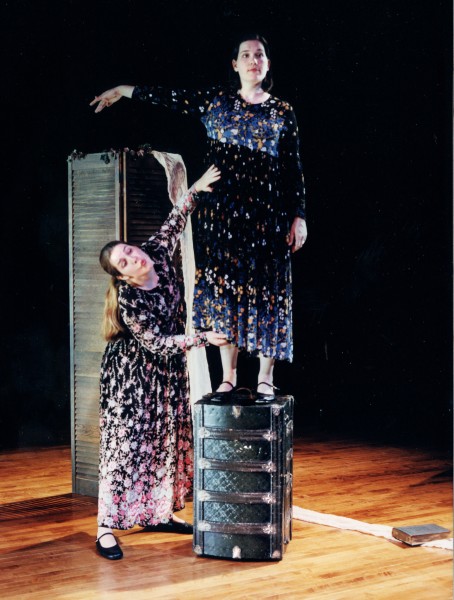
Jenny Odle Madden and Alice Rainey Berry bring Eudora Welty and one of her most beloved tales to life in MISSISSIPPI STORIES (Fowler Photography)
The Studio Theatre at Theatre Row
410 West 42nd St. between Ninth & Tenth Aves.
Thursday – Sunday through August 7, $35
www.summonersensemble.org
www.theatrerow.org
Summoners Ensemble Theatre and Memphis-based Voices of the South pay tribute to Pulitzer Prize-winning southern writer Eudora Welty in Eudora Welty — Mississippi Stories, a pair of minimalist one-acts, adapted and directed by Gloria Baxter and starring Jenny Odle Madden and Alice Rainey Berry, running at the small gray box Studio Theatre at Theatre Row through August 7. The show begins with a delightful interpretation of one of Welty’s most beloved short stories, “Why I Live at the P.O.” Published in the 1941 collection A Curtain of Green, the tale is narrated by Sister (Berry) as her family (all played by Madden) gathers for a July 4 celebration. Sister’s younger sibling, Stella-Rondo, spends the day turning everyone against Sister in shameful ways. “Stella-Rondo is exactly twelve months to the day younger than I am and for that reason she’s spoiled,” Sister explains. “She’s always had anything in the world she wanted and then she’d throw it away. Papa-Daddy gave her this gorgeous Add-a-Pearl necklace when she was eight years old and she threw it away playing baseball when she was nine, with only two pearls.” Stella-Rondo has left her husband, Mr. Whitaker, and returned home with a two-year-old daughter whom she insists is adopted despite the child’s highly suspicious resemblance to both Stella-Rondo and the absent Mr. Whitaker. As the women’s long-simmering rivalry heats up, Sister’s standing in the family grows more and more dire. Berry is spectacular as Sister, delivering Welty’s slyly uproarious words with the poetry and grace they deserve, the lines just flowing off her tongue as she walks around the three chairs that form all the scenery on the stark stage and maintains nearly continual direct eye contact with the audience, making sure no one misses a single instant. Fluidly shifting among multiple eccentric characters, Madden overplays her roles with exaggerated gestures and cartoony facial movements, but Berry manages to bring it all back home every time.
In the second act, Berry and Madden both portray Welty in “Listening,” the first chapter from Welty’s 1984 memoir, One Writer’s Beginnings. The chairs are removed and replaced by a trunk and a long spread of fabric on the floor, which occasionally come into play as Welty recounts scenes from her childhood that put her on her career path. (Madden:) “In our house on North Congress Street in Jackson, Mississippi, where I was born, the oldest of three children, in 1909,” (Berry:) “we grew up to the striking of clocks.” (Madden:) “There was a mission-style oak grandfather clock standing in the hall,” (Berry:) “which sent its gong-like strokes through the living room, dining room, kitchen, and pantry, and up the sounding board of the stairwell. Through the night, it could find its way into our ears; sometimes, even on the sleeping porch, midnight could wake us up.” Welty remembers discovering the moon and sun and stars, listening to her mother tell stories to her friends, and hearing such expressions as “Well, I declare,” “You don’t say so,” and “Surely not.” Madden then adds, “Years later, beginning with my story ‘Why I Live at the P.O.,’ I wrote reasonably often in the form of a monologue that takes possession of the speaker,” to which Berry finishes, “How much more gets told besides!” The second work lacks the drama of the first, but it still tantalizes with Welty’s glorious language and observations about time. Once again Berry is excellent, displaying a natural acting ability that helps distract from Madden’s grander tendencies, which are calmer here than in “Why I Live at the P.O.” The theater world is often overloaded with Shakespeare, Williams, Albee, Shepard, Miller, etc.; Eudora Welty — Mississippi Stories offers a splendid literary alternative. (Note: Ten percent of all ticket sales goes to the Mississippi Center for Justice, which seeks is dedicated to advancing racial and economic justice.)